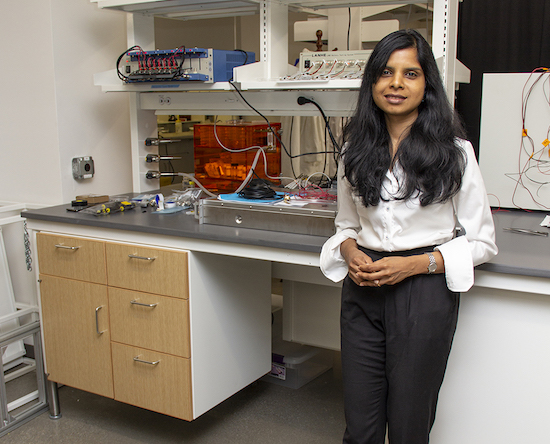Jayan project awarded $7.5 million
through the Department of Defense's MURI program
Sera Passerini
Jul 25, 2022

Source: College of Engineering
Jayan runs the Far-From-Equilibrium Materials Laboratory at Carnegie Mellon University.
B. Reeja Jayan, an associate professor of mechanical engineering, is part of a project recently awarded a $7.5 million Multidisciplinary University Research Initiative (MURI) grant from the U.S. Department of Defense. The five year project will study the effects of radiation damage on the performance of wide-bandgap electronics.
Jayan will lead the Carnegie Mellon University team to learn about the effects of various types of energy radiation on electronic materials to potentially identify ways to engineer radiation hardened materials for use in space exploration vehicles.
The team includes three other universities: the University of Iowa, the University of Central Florida and is led by the Pennsylvania State University.
This project, titled REDESIGN: Radiation Effects prediction through Experimentally validated Simulation of Gallium Nitride, will help to better estimate and relieve radiation damage in electronics with quantum-coherent sensing. Many electronics are silicon based and are more susceptible to degradation and damage from radiation.
Multiscale defect theory is an open area of fundamental research in the materials processing community and this MURI is well positioned to make incredible contributions in these areas.
B. Reeja Jayan, Associate Professor, Department of Mechanical Engineering
Using wide-bandgap semiconductors, like gallium nitride, provides better radiation resistance and could be very useful in applications that have higher levels of radiation like outer space. The team will research how radiation causes defects in wide-bandgap semiconductors and how to optimize them for radiation hardness.
“My team will use synchrotron x-rays to characterize the structural changes induced in semiconducting GaN thin films, which we know from our previous work can manifest as measurable changes in atomic displacements when these materials are exposed to radiation. The data we collect will integrate with spectroscopy, electron microscopy, and computational modeling to arrive at a holistic understanding of radiation damage," says Jayan.
"Multiscale defect theory (defect mapping, quantification) is an open area of fundamental research in the materials processing community and this MURI is well positioned to make incredible contributions in these areas.”
The Department of Defense has awarded $195 million in MURI awards for the Fiscal Year 2022 to 28 research teams spanning various disciplines, provided across five years. The MURI awards were created in 1985 to facilitate the growth of new technologies accelerated by multi-disciplinary insight. These technologies are valuable not only to the government and military, but also have multiple applications in the commercial sector.
Jayan is a faculty affiliate in the Wilton E. Scott Institute for Energy Innovation.
Media contact:
Lisa Kulick, lkulick@andrew.cmu.edu